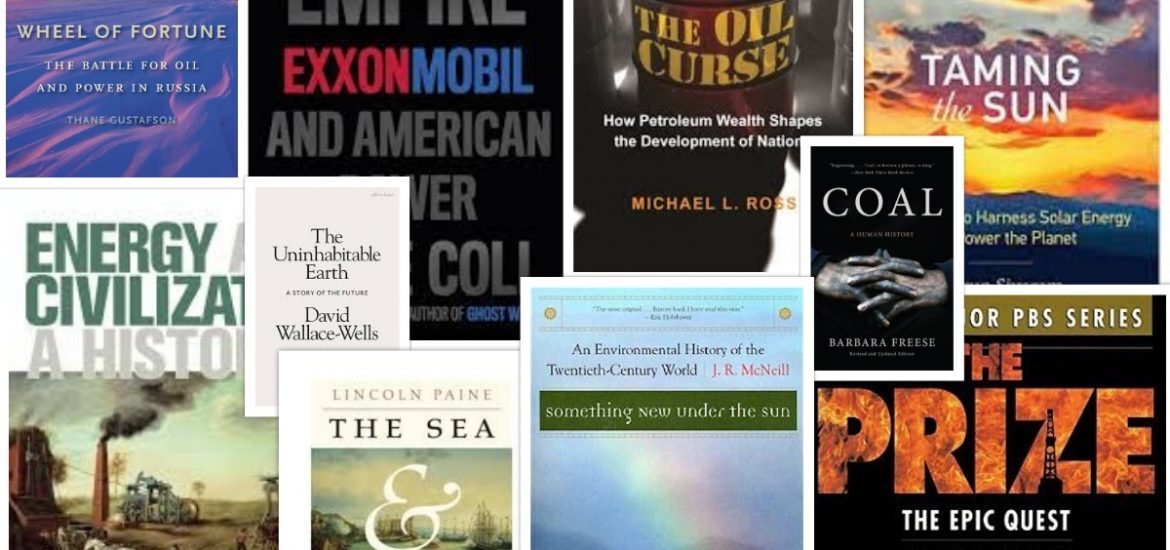
In January 2019, I embarked on the journey of reading and reviewing a new energy book every month, so it seemed a worthwhile excuse to take a break in December to provide you with a humble list of what I consider the best ten books ever written on energy. My background is in history, so there is plenty of that here. The longer time horizon of history, in my view, helps us separate trends from noise and avoid false exuberance about current developments. At the same time, the low-carbon energy transition and its accompanying technologies are multi-faceted and dynamic, so the list leans towards more contemporary studies of climate change and renewables.
Below is a top-ten list of books for those wanting to learn about the foundations of energy history, policy, and geopolitics. They are listed in the order I recommend reading, starting with:
1.) Vaclav Smil, Energy and Civilization: A History: Smil has written dozens of excellent books on energy – he is akin to what Bernard Lewis was to the field of Middle East studies. Originally written in 1986 then revised in 2017, Smil argues that energy transitions take a long, long time and that we should approach today’s energy challenge understanding that there are no quick fixes.
2.) Daniel Yergin, The Prize: The Epic Quest for Oil, Money & Power: This massive narrative history hooked me on studying the history of energy geopolitics. Some academics bemoan Yergin’s “cheerleading” of the oil industry, but the major oil companies, or so-called Seven Sisters, were the defining actors in global energy until the mid-1970s, and Yergin’s story runs from the mid-19th century to the end of the 1980s.
3.) John R. McNeill, Something New Under the Sun: An Environmental History of the Twentieth-Century World: Published nearly twenty years ago, there is still no clearer study of how humans have altered their environment – soil, sea, and atmosphere – in radical ways thanks largely to the use of fossil fuels and its iterations. A foundational text of environmental history, the book is replete with fascinating tidbits and anecdotes that make it an absolute pleasure to read.
4.) Barbara Freese, Coal: A Human History: Coal is the root of our climate problem and, despite the environmental community’s focus on oil, remains the biggest threat today, as developing countries continue to build new coal power plants. The history of coal is truly the story of energy and the modern world. Freese’s history is easy to read, thought provoking, and the ideal length.
5.) Michael L. Ross, The Oil Curse: How Petroleum Wealth Shapes the Development of Nations: This study helped pioneer a subfield of vital work on the relationship between oil, economic development, and political freedom. Its major flaw is confining the study to the period from 1980 to 2006 (for good reasons, I should add), but this choice forces students to think about how periodization, causality, geography, and sociology affect how nations relate to oil.
6.) David Wallace-Wells, The Uninhabitable Earth: Life After Warming: Wallace-Wells came to prominence on climate with his June 2017 extended essay in New York Magazine and researched the topic through the end of 2018 for his book. It covers the climate problem empirically, lays out its horrifying potential consequences, and unpacks the psychological and sociological reasons why humans are struggling to respond.
7.) Varun Sivaram, Taming the Sun: Innovations to Harness Solar Energy and Power the Planet: Technological advances have dramatically lowered the cost of solar power, causing it to surge in the global energy system. But policy has also been fundamental to its rise. Sivaram’s book is the most timely and insightful work on solar, ideal for those wanting to know more about a power source that everyone besides barrel-huggers should support.
8.) Thane Gustafson, Wheel of Fortune: The Battle for Oil and Power in Russia: If the United States has been the dominant oil power, Russia has been a close second. It was the world’s largest producer from 1898-1901 and again from 1976 to 1991. Gustafson tells the story of how the industry evolved during the two decades following the dissolution of the Soviet Union in 1991, competing for or holding the top spot again since 2008.
9.) Steve Coll, Private Empire: ExxonMobil and American Power: This is the best and only insider account of the most successful and secretive oil company in history. Coll pierces the bubble of the heir to the Rockefeller empire through detailed interviews, helping readers understand how ExxonMobil operated in the 1990s and 2000s, especially in managing the threat of climate change to the oil business through artful, disingenuous public relations.
10.) Lincoln Paine, The Sea and Civilization: A Maritime History of the World: This may sound a bit far afield for energy, but the shift to the seas starting in the sixteenth century defined the modern world. Coal then oil helped the navies of Britain and then the United States control the seas and global commerce. Dominance at sea still remains the linchpin of global power today, but the rise of satellites, aviation, missiles, and space technology could change this one day soon.





